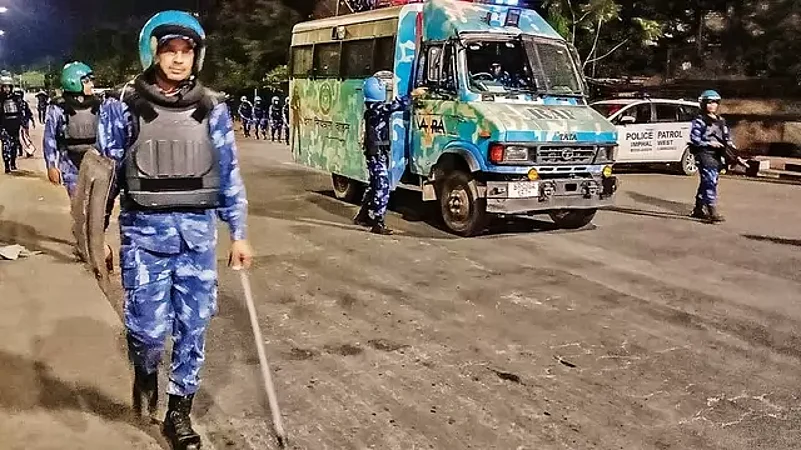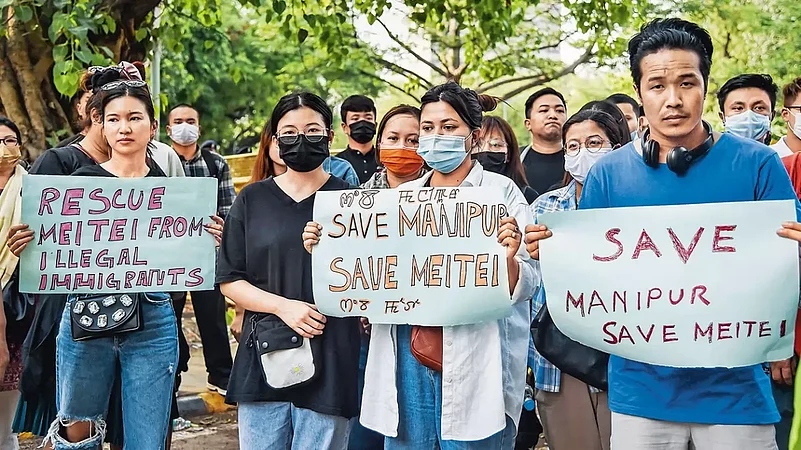The recent riots in Manipur broke out to the surprise of many. It came amidst the state’s journey towards a peaceful resolution of various political demands by militant groups, and the projection of the state as a tourism and investment destination.
The development of the Loktak lake and Sangai Ethnic Park at Moirang Khunou as tourist attractions along with the Shirui Lily Festival at Ukhrul, the promotion of Geljang Resort located at Churachandpur, the Khongjom War Memorial Complex and the Indian National Army Memorial at Moirang were some of the visible ones. In fact, the state hosted the grand finale of Femina Miss India 2023 last month. This was the first time in the pageant’s history that it was held in the Northeast.
Advertisement
Despite such projections of the state as a peaceful destination worth visiting and investing in, there were simmering tensions within the state wherein marginal groups found some of the policies of the current government as discriminatory, including those involving displacement.
Manipur has been prone to conflict, and several violent ethnic clashes took place in the 1990s. During those times, militant movements were unsurmountable and so pervasive that the state was unable to handle them effectively. Two decades on, the state’s capacity to control conflict has increased and the law-and-order situation has improved.
Yet why did the Manipur riots happen and who is responsible for it are the uncomfortable questions that need to be asked for the sake of accountability. The scale of arson and violence, particularly the gruesome rape and killing of students and the unruly mob violence in the streets of Imphal, is unimaginable and unexpected. According to an official report on May 9, there were 60 deaths, 230 people injured, 1,700 houses damaged, 1,041 firearms looted, and 20,000 people shifted to safer places. There may have been more deaths that went unrecorded.
Advertisement

During Chief Minister N Biren Singh’s first term, some populist programmes like “Go to the Hills” and “Go to Village” were launched, despite delivering trivial services in the rural i.e. hilly areas. Since returning to power for a second consecutive term in March 2022, this time with a singular majority, the government has acted in aggressive ways, focusing on issues like deforestation, illicit crop cultivation, illegal immigration, and drug trafficking. However, the way Singh’s party attempts to address these issues is through the selective targeting of a particular community, despite the problems having been prevalent throughout the state, cutting across communities and geography.
For example, a forest department order dated November 7, 2022, annulled all past government orders regarding human habitation in villages inside the Churachandpur–Khoupum Protected Forest, claiming past orders to be “imperfect, defective, erroneous and unacceptable”. The special order suddenly turned many Kuki villagers into encroachers or trespassers in their ancestral lands. These new standards that the government devised are unfair to the hill communities, as they owned the land and forests for centuries. To them, the cancellation of orders for setting aside forest areas lacks legitimate expectation, legal certainty, and devoid of the principles of natural justice.
Advertisement
To the Kukis, it is the case of selective or unequal enforcement of the law. Among the 36 reserved forests and 22 protected forests in 14 forests divisions of the state, the state government is focused on certain forest divisions such as Kangpokpi and Churachandpur, districts where Kukis dominate the demography. In order to give more teeth to the forest department, the forest guards were recently equipped with arms. As per reports on March 7, 2023, forest guards of six divisions were trained at the Manipur Police Training College, Pangei, for arms handling and operations. These are in contradiction to the National Forest Policy of 1988 which attempts to associate tribal people in joint forest management along with forest officials.
Advertisement
An eviction drive was carried out at K. Songjang village in Churachandpur district on February 20, 2023. This happened despite the villagers’ objection to the acquisition of their village for the protected forest project that had been accepted by the administration 37 years ago and that acceptance continued till November last year, when the current government arbitrarily withdrew it Even though the villagers’ point of view in terms of ownership of forest land had been accepted for the last 37 years. Though the special order mentioned the decision of the state cabinet to appoint an authority to recommend measures for rehabilitation or relocation, people had no expectations of such measures to be undertaken. Here, the Indian Forest Act 1927 has been weaponised to disposess tribals of their lands and forests.
Advertisement
The eviction drives coincided with months-long water scarcity, and the blame was placed on the alleged illicit cultivation and traditional farming practices in the hills. This was despite the fact that the practice has largely eroded with the participation and suggestion from the Kuki community itself. But the demonisation continued as the intention was to dehumanise the Kukis as a whole.
To protest against the selective eviction drive, the Indigenous Tribal Leaders Forum (ITLF) organised peaceful rallies in Churachandpur, Kangpokpi and Tengnoupal districts. The rallies were peaceful except in Kangpokpi where the police tried to stop protesters from gathering, resulting in violence. However, Singh tried to implicate insurgent groups even where the rallies were peaceful. He threatened insurgent groups with ending the tripartite ceasefire, even though he was unsuccessful in convincing the Union home ministry to withdraw the ceasefire. The tripartite ceasefire was the result of the Suspension of Operations (SoO) pact signed in 2008 between the central government, the Manipur government and Kuki insurgent groups.
Advertisement
In April this year, the forest and revenue departments attempted to conduct a joint survey of the disputed Churachandpur–Khoupum Protected Forest area. The ITLF, in a consultative meeting held on April 19, unanimously resolved to oppose “all forms of survey”, claiming “procedural lapses” and terming the initiative as “illegal and unconstitutional”.
Amidst the prevalence of such discontent against the policies of the state government, an open gym was slated to be inaugurated in Churachandpur by the chief minister on April 28. In a show of displeasure towards his policies, an angry mob vandalised the open gym and set it on fire the night before the slated inauguration.
Advertisement
In May, ahead of the All Tribal Students Union Manipur (ATSUM)’s ‘tribal solidarity rally’ organised to protest the demand for inclusion of Meitei community in the Scheduled Tribe (ST) category, counter-blockades were imposed in Meitei-dominated Imphal valley. On the eve of the rally, Meitei volunteers on the Imphal-Saikul road sent back vehicles moving towards Saikul. This road was particularly chosen because the subdivision has an almost homogenous population consisting of mainly Kukis.
While the May 3 rally was going on peacefully, some miscreants burnt the Anglo-Kuki Centenary gate near Leisang village in Churachandpur. It resulted in a clash at Kangvai on the border of Kuki-dominated Churachandpur and Meitei-majority Bishnupur districts. The violence was livestreamed on Facebook in the comment section of which was an appeal not to refer to the rival side as ‘tribal’ or ‘hao’ in Manipuri but specifically as Kuki.
Advertisement
This singling out of the Kukis as the enemy during this riot rekindled the memories of the Meitei-Pangal conflict in the Imphal valley three decades ago. The violence that started on May 3, 1993 lasted for three days where the police commandos were alleged to have aided the perpetrators. During the recent conflict as well, there were several allegations of police commandos clearing the little resistance that villagers could put up while the radicalised Meitei volunteers were resorting to arson and destruction of houses and other properties.
The selective targeting is also visible in the large-scale incineration of houses and churches in Imphal. The houses and churches of other tribal groups were carefully spared except for few houses and churches that were accidentally burnt. Most Kuki localities were identified after which attacks began on their churches. Houses were looted and burnt thereafter.
Advertisement
An uncomfortable question to be raised with regard to the recent Manipur riots is how was it possible for unruly mobs to loot heavily armed police stations and the police training college without a single incident of armed confrontation? This could not happen without the complicity of the state government. At the heart of the state capital, the police remained mere onlookers to the attacks, killings, and arsons.
The violence also reached Delhi, where a group of Kuki students of Delhi University that had gathered at a place of worship on the evening of May 4 to pray for peace in Manipur, were attacked by Meitei youths. There were attempts to intervene when a police complaint was lodged. It was only after a huge protest outside the police station that an FIR was registered. The story of such discrimination and othering will continue amid unequal power relations, until there is direct intervention from New Delhi. No crisis should be impossible to handle, if necessary instructions are given to the law enforcement agencies.
Advertisement
(Views expressed are personal)
Thongkholal Haokip is assistant professor at the centre for the study of law and governance at JNU
This appeared in print as "Fire In The Hills"




















